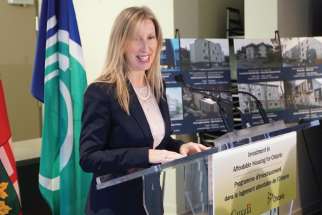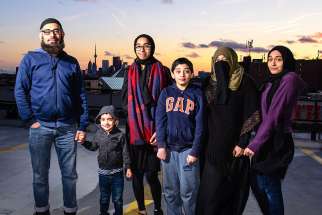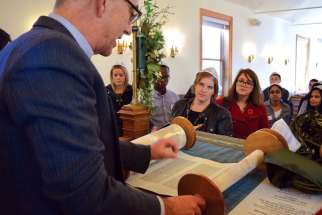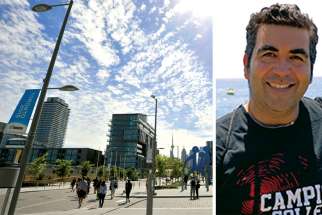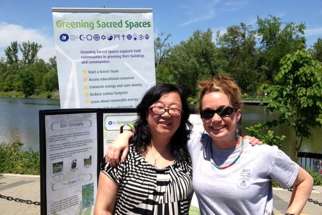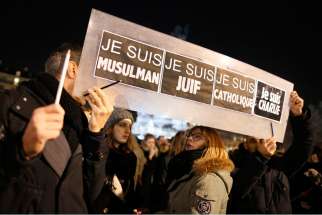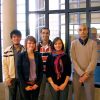Multi-faith housing vision becomes reality
OTTAWA – Suzanne Le earned two degrees during her years in university — a bachelor’s in comparative religion and a master’s in conflict studies.
Young people in search of a common love for God
Combine a little walk, a little prayer, three churches and group of young people from a variety of faiths, and you have the makings of a pretty interesting Sunday afternoon in downtown Toronto.
Chaplaincy team ready for Pan Ams
TORONTO - Growing up in Venezuela, Fr Eduardo Soto fell in love with the Pan Am Games when his home country hosted the quadrennial event in Caracas in 1983.
Adding faith to climate conversation
Fossil Free Faith has launched a new program recruiting youth to lead the conversation in their faith communities about divesting in fossil fuel companies.
PARIS - As France emerges from its worst terrorist attack in decades, a biting novel that imagines the country governed by Islamic law is part of a swirling debate about its basic values. Will the country respond to the shootings with fear and xenophobia, as suggested by the book“Soumission, or Submission — or embrace its multicultural, multifaith identity?
University receives federal funds for religious diversity project
(CORRECTION 24/10/12 to Michael Taylor's job title)
TORONTO - Citizenship and Immigration Canada has granted half-a-million dollars over three years to the University of Toronto for its Religious Diversity Youth Leadership project.
Launched in late September, the program investigates and acts upon the problems and possibilities of living in a religiously diverse society.
“The most important thing the CIC funding was looking for was the kind of projects that would bring together communities that wouldn’t normally be talking to each other,” said Pamela Klassen, professor in the Department for the Study of Religion and director of the Religion in the Public Sphere Initiative.
The project promises to bring together and build networks of communication between students, faculty, community leaders and youth in the Greater Toronto Area. It is run by the U of T’s Multi-Faith Centre for Spiritual Study and Practice, the Religion in the Public Sphere Initiative and the Centre for Community Partnerships. The project aims to raise awareness on how religious diversity and civic responsibility are connected and to work against exclusion and marginalization.
“We put in a proposal, the RPS, together with the Centre for Community Partnerships and the Multi-Faith Centre that was focussed on a university-based project that would take students out into the community and bring various community organizations in contact with students and with the wider university,” Klassen said.
The project has three main activities. The religious diversity youth training activity will have U of T students enrolled in a service-learning certificate program, which is meant to prepare them for serving in diverse communities, including religious communities.
In the next category of activity, academic and service-learning community partnerships, young adults will work in community organizations or university departments to see first-hand how civic responsibility and religious diversity play out in real-world situations.
“Just as our society becomes more diverse, our responses to spiritual and religious care should evolve with it,” said panelist Michael A. Taylor, Regional Manager with the Ontario Multifaith Council and a mental health professional. “A nation that accepts diversity should accept the entire diversity of a person.”
The third category of activity is the public forums and community research workshops. This connects policy makers, scholars, community leaders, practitioners and students.
The first forum was held on Sept. 27, the day the project launched. Titled “Care of Souls and the Soul of Care,” the forum lasted two days and was held to discuss the successes and failures of religion in publicly funded health care and the challenges religious diversity poses for biomedical health care.
On day two of the forum, the community research workshop brought together palliative care doctors, neonatologists, nurses, executives, hospital chaplains, scholars and students.
“What happens when a young baby dies in an ICU in the hospital and it’s a Muslim baby and the parents don’t want to wash the body, but the nurse thinks the body must absolutely be washed,” said Klassen, recalling the events of the workshop. “How do they negotiate those very emotionally fraught kinds of questions and understand what kinds of compromises the health care system can and cannot make to accommodate religious concerns?”
Future forums will address gender and sexuality in religious communities, youth violence and religious identity, as well as religion and the arts.


